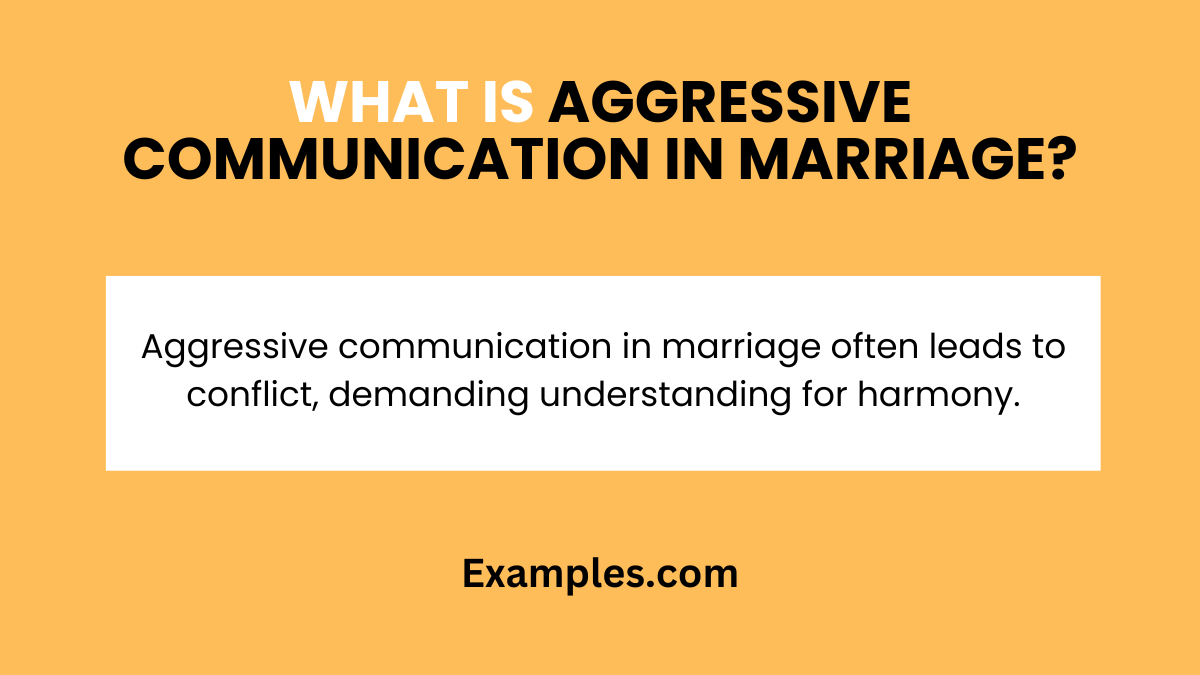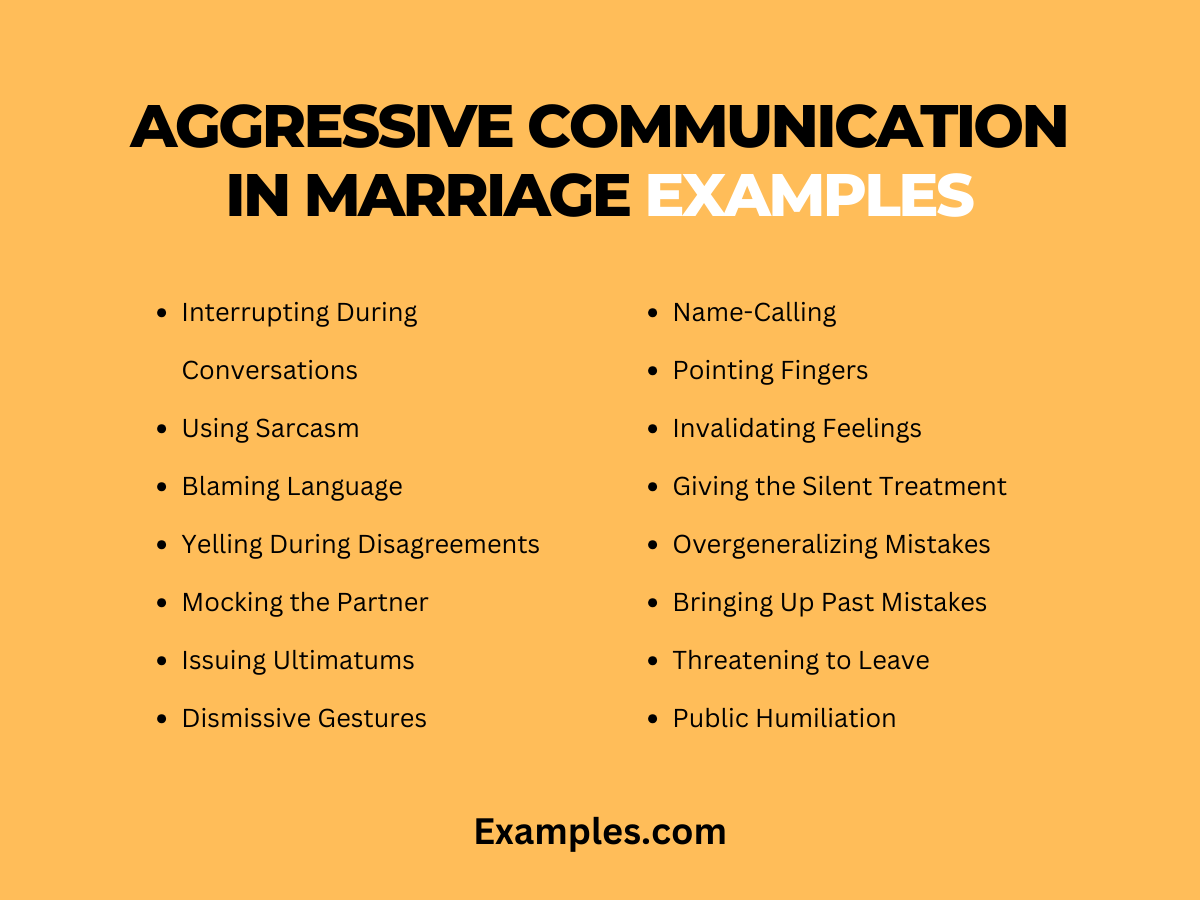14+ Aggressive Communication in Marriage Examples
In the intricate dance of marriage, communication plays a central role. Aggressive communication, often seen as a hurdle, can actually be a window to deeper understanding when managed correctly. This guide delves into the realm of aggressive communication in marriage, offering real-life examples and insights. It examines how such communication contrasts with passive approaches, highlighting effective ways to navigate these challenging but common marital interactions. Ideal for couples seeking to enhance their communication skills, this guide is a treasure trove of information.
What is Aggressive Communication in Marriage?

Aggressive communication in marriage refers to interactions where one partner communicates in a way that may be perceived as forceful, dominating, or overly assertive. This style can manifest through both verbal and nonverbal communication. While it often stems from a desire to be heard or to assert one’s viewpoint, it can inadvertently lead to misunderstandings, hurt feelings, or conflict. Understanding this communication style is crucial for couples looking to foster a more harmonious and supportive relationship.
What is the Best Example of Aggressive Communication in Marriage?

The best example of aggressive communication in marriage often revolves around conflict situations where emotions run high. For instance, during an argument, one partner might dominate the conversation, interrupt, or use accusatory language, leaving little room for the other to express their perspective. This can escalate tensions and inhibit constructive dialogue. Recognizing and addressing such patterns is key to transforming aggressive communication into a more effective and empathetic exchange.
15 Aggressive Communication in Marriage Examples

Aggressive communication in marriage can manifest in various forms, from subtle nonverbal cues to overt verbal outbursts. This section showcases 15 distinct examples, each with a brief explanation and example sentences, illustrating the diverse ways aggressive communication can surface in marital relationships. These examples, enriched with SEO and NLP-friendly keywords, offer insights into recognizing and understanding aggressive communication patterns, crucial for fostering healthier and more empathetic marital interactions.
- Interrupting During Conversations: Constantly interrupting signifies a lack of respect for the partner’s opinions. Example: “I don’t care what you think, listen to me first.”
- Using Sarcasm: Sarcastic remarks can undermine and belittle a partner’s feelings. Example: “Oh, you’re a genius now, aren’t you?”
- Blaming Language: Shifting blame to the partner without accepting any responsibility. Example: “This is all your fault, you always mess things up!”
- Yelling During Disagreements: Raising one’s voice to overpower the other’s viewpoint. Example: “I can’t believe you don’t understand this!”
- Mocking the Partner: Making fun of the partner’s expressions or thoughts. Example: “Ha, that’s the silliest idea I’ve ever heard!”
- Issuing Ultimatums: Forcing decisions under pressure. Example: “If you don’t agree with me, then maybe we shouldn’t be together.”
- Dismissive Gestures: Nonverbal cues like rolling eyes or shrugging off concerns. Example: Rolls eyes “Your concerns are not that important.”
- Pointing Fingers: Physically pointing or aggressive body language during arguments. Example: Points finger “You always do this!”
- Name-Calling: Using derogatory names or labels in heated moments. Example: “You’re being so lazy and selfish!”
- Invalidating Feelings: Dismissing or trivializing the partner’s emotions. Example: “Stop overreacting, it’s not a big deal.”
- Giving the Silent Treatment: Refusing to communicate as a form of control. Example: Ignores partner “I won’t talk until you apologize.”
- Overgeneralizing Mistakes: Using terms like ‘always’ or ‘never’ in criticism. Example: “You never listen to me, you’re always distracted!”
- Bringing Up Past Mistakes: Repeatedly mentioning old issues during new arguments. Example: “Just like last time, you’ve ruined everything again.”
- Threatening to Leave: Using the threat of abandonment in arguments. Example: “If you don’t change, I’ll leave you.”
- Public Humiliation: Criticizing or belittling the partner in front of others. Example: “Can you believe how clueless my partner is?”
Characteristics of Aggressive Communication in Marriage
- Dominating Conversations: Aggressive communication often involves one partner dominating discussions, leaving little space for the other to voice opinions. This imbalance hinders effective communication and mutual understanding in the relationship.
- Frequent Criticism: A hallmark of aggressive communication is consistent criticism, often without constructive feedback. This can lead to a negative atmosphere, overshadowing good communication skills that are essential for healthy interactions.
- Defensive Responses: In marriages with aggressive communication, defensiveness is common. Rather than listening and understanding, partners often react defensively to protect themselves, further escalating conflicts.
- Blame Shifting: Aggressive communicators tend to shift blame to their partners, avoiding accountability. This lack of open communication can create a cycle of guilt and resentment.
- Intimidating Body Language: Nonverbal cues like aggressive gestures or facial expressions often accompany aggressive verbal communication, adding an additional layer of intimidation and discomfort in conversations.
What Defines Aggressive Communication in Marriage?

- Direct and Forceful Language: Aggressive communication is often characterized by direct, blunt, and sometimes harsh language. This style can be overpowering and leave the receiving partner feeling belittled or disrespected.
- Lack of Emotional Sensitivity: A key feature is the lack of sensitivity to the partner’s emotions. Such communication often overlooks the need for empathy, critical in interpersonal communication.
- Control and Power Dynamics: Aggressive communication often involves an attempt to control or exert power over the other partner. This creates an unequal dynamic, hindering passive communication and mutual respect.
- High Conflict and Tension: Relationships marked by aggressive communication tend to have higher levels of conflict and tension, as this style provokes defensive reactions rather than collaborative solutions.
- Minimal Active Listening: Aggressive communicators often fail to actively listen, focusing more on responding or arguing their point, which is contrary to effective communication practices.
How Does Aggressive Communication Behavior Manifest in a Marriage?

- Frequent Arguments: Aggressive communication often leads to an increased frequency of arguments, as discussions quickly escalate into conflicts due to the confrontational nature of the communication.
- Emotional Distance: Over time, this communication style can create emotional distance between partners, as the constant aggression can wear down feelings of closeness and affection.
- Eroded Trust: Trust in the relationship can erode, as aggressive communication can make one feel unsafe or undervalued, impacting the overall trust and security within the marriage.
- Reduced Problem-Solving Efficiency: Aggressive communication often hampers effective problem-solving, as it focuses more on blame and winning the argument rather than finding a mutually beneficial solution.
- Impact on Mental and Emotional Health: Continuous exposure to aggressive communication can have a negative impact on both partners’ mental and emotional health, leading to stress, anxiety, and even depression.
Understanding and addressing aggressive communication in marriage is crucial for fostering a healthy, respectful relationship. This guide offers insights and practical examples to identify and transform aggressive patterns into constructive dialogues. By embracing empathy and effective communication strategies, couples can navigate these challenges, enhancing their bond and ensuring a more harmonious marital life.



